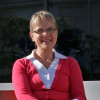
Published in German 10 years after the death of Cicely Saunders, Der Horizont ist nur die Grenze unserer Sicht is a worthy tribute to her and a significant contribution to the continuing Saunders legacy. Diverse in content, liberal leaning in its theology, Beyond the Horizon has roots deep in tradition and draws on several cultures, belief systems and influences. Characteristically, it includes writings by some of St Christopher’s own patients.
By the early 1980s Dame Cicely Saunders was entering into her final years as Medical Director of St Christopher’s Hospice, which she had founded in London in 1967.
Building on older traditions, she had created a new approach to the care of the dying – one which saw suffering as something multi-facetted and containing social, psychological, spiritual and physical elements. Her ideas and approach had gained worldwide recognition. Hospices were being founded in countries all around the world and the new field of palliative care was gaining increasing recognition from the medical establishment.
Recently married for the first time and now in her sixties, she was enjoying a period of significant professional and personal fulfilment. St Christopher’s had just played host to its first international conference, her biography was being written by Shirley du Boulay, and a string of honorary doctorates was coming her way from distinguished universities in many countries. She had also received the prestigious Templeton Prize for outstanding contributions in the field of religion.
Thinking freely
It was a moment to feel more expansive, to think freely and to try out new ventures. In this spirit she brought together a small collection of writings in a volume called Beyond all Pain, which was published by SPCK in 1983[1].
This little book of 88 pages comprised a personal selection of poems, prayers and other writings which Cicely Saunders had found helpful both in her work and in her own personal encounters with illness, loss and sorrow. The book was offered to those who face death and suffering and also those who care for them. The writings were grouped under five headings: the search for meaning; anger; suffering; dying; and resurrection. There were contributions from the work of writers of diverse orientation and character, including the founder of logo-therapy and concentration camp survivor Viktor Frankl; the theologian Teilhard de Chardin, and the novelist DH Lawrence. Also present were some poems by patients cared for at St Christopher’s Hospice.
Although the publisher reduced the emphasis on bereavement that she had wanted for the book, taking out three sections in the process, Saunders was pleased with her ‘little volume’ and sent it enthusiastically to many friends and colleagues. It was widely read and appreciated.
But she still felt there was potential for a slighter fuller collection, more in the spirit of her original idea and which in addition to the five published sections would also include further material on: ‘dying’, ‘gone away’, ‘left behind’ and ‘get going’. The challenging final theme was about taking up a new commitment to life following experiences of loss and bereavement. It included prayers from John Taylor’s A Matter of Life and Death, published in 1986.
Beyond the Horizon
This expanded version of the first book, had the modified title Beyond the Horizon [2]. It has now been translated by Martina Holder, who has done so much to bring the work of Cicely Saunders to a German-speaking audience, and has been published by TVZ in Zurich [6]. Martina explained to me how the idea of the translation came about:
In 2011, while staying in Grandchamp, where Cicely Saunders stayed before she opened her Hospice St. Christopher’s in 1967, I was able to talk with Sr. Minke. Sr. Minke was for many years the leading figure of that Christian protestant convent in Switzerland and could remember Cicely Saunders visits. She was very encouraging that Saunders ‘Watch with me’ had been translated and that a book about her biographical journey was also on the way. She was aware that palliative care had changed and developed hugely over the last decades but also felt that Cicely Saunders theological work had not been reflected enough. She suggested to me that a translation of ‘Beyond the Horizon’ would be a good way to help illuminate some aspects of the history of the modern palliative movement better. I kept that in mind, not knowing at the time, what a challenge it would be to translate it, especially the poetry! However with much help from the publishers who also believed that the project was a worthwhile step in the discussion around the foundations of Palliative Care, I kept up work on the translation.
This new edition of Beyond the Horizon is a translation of a work that is still relevant today. You may enjoy listening to Martina and I discussing the influence of theology on the work of Cicely Saunders, in this audio interview which we recorded in October 2015.
David Clark
References
- Saunders C. Beyond All Pain: A companion for the suffering and bereaved. London: SPCK, 1983, pp 88
- Saunders, C. (1990) Beyond the Horizon. London: Dartman, Longman and Todd, pp99
- Clark, D (2003) Foreword. In C Saunders Watch with Me. Inspiration for a life in hospice care. Sheffield: Mortal Press
- Clark D (2002) Cicely Saunders. Founder of the Hospice Movement: Selected Letters 1959-1999. Oxford: Oxford University Press, pp 397
- Clark, D (2006) Introduction. In Saunders, C Selected Writings 1958-2004. Oxford: Oxford University Press, ppxiii-xxvii
- Saunders, C (2015) Der Horizont ist nur die Grenze unserer Sicht. trans Martina Holder. Zurich: TVZ


[…] is a theologian working at the University of Bern. In 2015 she translated Cicely Saunders’ book Beyond the Horizon into German, Der Horizont ist nur die Grenze unserer […]